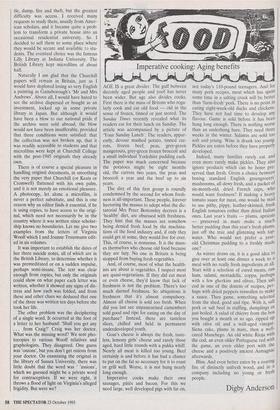Imperative cooking: Aging benefits
AGE IS a great divider. The gulf between decently aged people and yoof has never been wider. But age also divides cooks. First there is the mass of Britons who regu- larly cook and eat old food — old in the sense of frozen, tinned or just stored. The Sunday Times recently revealed what its readers eat for their lunch on Sunday. The article was accompanied by a picture of `Your Sunday Lunch'. The readers, appar- ently, devour mashed potato, tinned car- rots, frozen beef, peas, grey-green mangetouts, grey-green frozen broccoli and a small individual Yorkshire pudding each. The paper was much concerned because the potatoes might be eight months old, the carrots two years, the peas and broccoli a year and the beef up to six years.
The diet of this first group is roundly condemned by the second for whom fresh- ness is all-important. These people, forever hectoring the masses to adopt what the dic- tatorial Mrs Peter Bottomley decrees is a `healthy' diet, are obsessed with freshness. They hint that the masses are somehow being denied fresh food by the machina- tions of the food industry and, if only they could get at some, they would live for ever. This, of course, is nonsense. It is the mass- es themselves who choose old food because they are lazy. No one in Britain is being stopped from buying fresh vegetables.
And, of course, most of what the health- ists are about is vegetables. I suspect most are quasi-vegetarians. If they did eat meat or even cheese, they'd know that lack of freshness is not the problem. There's too much darned freshness. So ubiquitous is freshness that it's almost compulsory. Almost all cheese is sold too fresh. When did you last see unpasteurised camembert sold good and ripe for eating on the day of purchase? Instead, there are tasteless slices, chilled and held in permanent underdeveloped youth.
Goat's cheese is always the fresh, taste- less, lemony girls' cheese and rarely those aged, hard little rounds with a pukka whiff. Nearly all meat is killed too young. Beef certainly is and before it has had a chance to put on the fat so necessary for it to roast or grill well. Worse, it is not hung nearly long enough.
Imperative cooks make their own sausages, pâtés and bacon. For this we need large, well developed pigs with fat on, not today's 110-pound teenagers. And for many pork recipes, meat which has spent some time in a salting crock will be better than 'farm-fresh' pork. There is no point in eating eight-week-old ducks and chickens. They have not had time to develop any flavour. Game is sold before it has been hung long enough. There is nothing worse than an underhung hare. They need three weeks in the winter. Salamis are sold too soft and young. Wine is drunk too young. Pickles are eaten before they have properly developed.
Indeed, many families rarely eat and even more rarely make pickles. They also ignore products which can be better pre- served than fresh. Given a choice between boring standard English greengrocers mushrooms, all dewy fresh, and a packet of six-month-old, dried French ceps, who would want freshness? If making a heavy tomato sauce for meat, one would be mad to use pithy, pippy, leather-skinned, fresh English tomatoes rather than dried Italian ones. Last year's fruits — plums, apricots — preserved in marc make a much better pudding than this year's fresh plums, just off the tree and glistening with tap- water. Who would not prefer a year- old Christmas pudding to a freshly made one?
As winter draws on, it is a good idea to give over at least one dinner a week to a meal with no really fresh ingredients at all. Start with a selection of cured meats, raw ham, salami, mortadella, coppa, perhaps with a few gherkins and olives. Then salt cod in one of the dozens of recipes, per- haps with dried peppers reswollen to make a sauce. Then game, something selected from the shed, good and ripe. With it, salt pork or salt beef in stuffing, dumplings or just boiled. A salad of chicory from the box you bought a month or so ago, zipped LIP with olive oil and a well-aged vinegar. Siena cake, plums in mare, then a well- cured Manchego. An old white Rioja
with the cod, an even older Portuguese red with the game, an even older port with the cheese and a positively ancient Armagnac afterwards.
Bliss. And even better eaten by a roaring fire of distinctly unfresh wood, and in a company including no young or fresh people.
Digby Anderson


































































 Previous page
Previous page